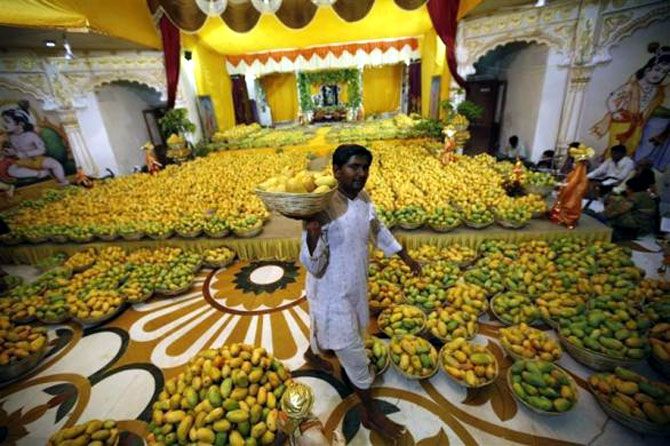 Gujarat has started taking steps to boost incomes of farmers cultivating mangoes
Gujarat has started taking steps to boost incomes of farmers cultivating mangoes
Lavishing Satasia of Dhari tehsil of Amreli district in Gujarat is one happy mango farmer.
Thanks to the budding cooperative movement in mango farming in his district, he has begun to fetch double the price for his Kesar mangoes compared to last year.
“People in my village (Sukhpur and adjoining areas) were cutting down their mango farms to make way for peanut and wheat cultivation as it was more rewarding. Mango farming is a once-a-year harvest and the yield fluctuates with vagaries of nature (storm, unseasonal rains etc),” says Satasia.
Now that he has started selling his mangoes to a farmer producer company in the region Avirat, he is fetching Rs 400-425 for 20 kg (wholesale price) compared to Rs 200-250 for 20 kg earlier.
Around 800 farmers like Satasia’s have benefited from the budding mango cooperatives in the state.
Kesar, produced mainly in Gujarat, is the second highest exported variety from the country after Alphonso, followed by Banganapalli, Rajapuri and Dashehari varieties, say traders.
Gujarat took the lead when it came to empowering farmers in dairying, and now the state has started taking baby steps to boost farmer incomes in mango farming.
Raju Deepti, a local social worker, has taken a leaf out of Gujarat Cooperative Milk Marketing Federation, which runs the Amul brand of dairy products, and formed a special purpose vehicle called Dedicated Initiative for Sustainable and Holistic Agriculture.
With Avirat Agro Producer Company and Rukmavati Rural Agro Producer Company as stakeholders, DISHA does mango marketing on the lines of cooperatives.
DISHA is a farmer-oriented multi-stakeholder agri business enterprise, says Deepti.
Under the initiative, farmers from Kutch in Gujarat and districts such as Amreli came together to market their mangoes under a single brand, and directly to the consumer by-passing the middlemen.
Last season, 750-800 farmers could sell about 130 tonnes of mangoes. Next season, the target is to bring together 2,000 farmers and sell 500 tonnes of mango.
According to Deepti, they have come up with a brand ‘Omang’ for the premium range of mangoes, while the common mangoes are sold under the 'Sangh' brand.
"As for marketing our produce, we have tied up with different channels.
"A cooperative dairy in Gandhinagar, which sells milk under Madhur brand sells our mangoes while in South Gujarat, J M Industries markets the mangoes; in Ahmedabad and Anand, it is marketed by Shristi Organics.”
Having retail outlets is critical for a farmer brand to survive, says Abhijeet Bhasale, managing director of Pune-based mango import-export house Rainbow International, which also sells its products through mangowale.com.
Maharashtra itself has seen some traction in mango cooperatives in recent years with cooperatives such as Devgad Taluka Amba Utpadak Sahakari Sanstha Maryadit coming into the fore. Wholesalers and exporters cannot compete in price if a farmer chooses to retail his own products, says Bhasale.
He adds that the challenge lies in choosing the right channels to market the products.
"Production and wholesale is one thing, and marketing the produce under a brand is a completely different thing."
Satasia agrees.
"We are producers; we do not know about marketing. Earlier, the middlemen would eat all the profits, but now we are aware and understand the strength of building a brand."
According to Deepti, a farmer basically gets one-third of the retail price of mangoes when he goes through the normal trade channel.
"Here, where procurement is done by a farmer producer company like Avirat and the mangoes are marketed under a specific brand, the farmers are able to fetch better prices, about 50 per cent of the retail price."
The plan for 2016 season is to explore the exports market as well as tie up with modern trade to sell the Omang and Sangh brands of Gujarati kesar mangoes.
In Maharashtra, a leading mango-producing state, cooperatives account for 10 per cent of overall production. The state produces around one million tonnes of Alphonso and other mango varieties.
India produces about 15 million tonnes of mangoes, of which only 1.5-3 per cent are exported, while the rest is consumed domestically.
Bhasale, however, is of the opinion that mango cooperatives are still at a nascent stage and largely fragmented.
Hence, it is yet to see the traction that cooperative dairying witnessed a few decades ago.
Shankarsinh Rana of Madhur Dairy claimed the response from customers has been phenomenal as people prefer organic mangoes that do not have residues of pesticides.
"It seems the next season will be even better. The concept would gather steam soon," he noted.
Devgad Taluka Mango Growers Co-operative Society was initially formed around three decades ago to bring the producers under one umbrella and command a fair price from the market or brokers.
They eventually focused on building their own brand of Devgad mangoes that would fetch better prices.
Taking a cue from Devgad mangoes, DISHA now aims to market Gujarat's kesar mangoes.
DISHA is supported by Aashray (a government-approved techno-social business incubator), which has been established to carry on business and undertake the activities to set up and manage Incubation and Research Centre for promotion of Innovations, setting up of social enterprises and scaling of innovative ventures and grassroots technologies.
Image: A priest carries a basket of mangoes to distribute among devotees after it was offered to Lord Krishna inside a temple during a mango festival in Ahmedabad. Photograph: Amit Dave/Reuters
The image is used for representational purpose only












 © 2025
© 2025